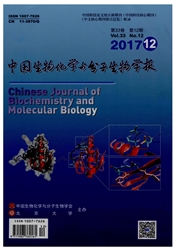

 中文摘要:
中文摘要:
为了探讨胚胎干细胞分化心肌细胞(ESCM)毒蕈碱受体的表达规律及β肾上腺素能系统对M2受体表达的影响,采用10^-4mol/L维生素C体外诱导小鼠M13胚胎干细胞分化为心肌细胞,用RT-PCR检测到分化后的细胞表达心肌细胞特异性基因Nkx2.5和β肌球蛋白重链;用免疫荧光法检测到分化后的细胞表达心肌细胞特异性标志物α辅肌动蛋白.小鼠胚胎干细胞分化前表达M1和M2毒蕈碱受体,在分化过程中,M1受体表达逐渐下降,M2受体表达在第3d显著下降,此后表达逐渐增加,在第14d达到高峰;Western印迹结果显示,异丙肾上腺素明显抑制M2受体的表达,选择性β1肾上腺素受体拮抗剂CGP20712A明显上调其表达,而选择性β2肾上腺素受体拮抗剂ICI118551对其表达无影响.本实验表明,小鼠胚胎干细胞分化心肌细胞表达毒蕈碱受体,β肾上腺素能系统对M2受体表达有调控作用.
 英文摘要:
英文摘要:
To investigate the expression pattern of muscarinic receptors in cardiomyocytes derived from embryonic stem cells (ESCM) and β-adrenergie modulation of M2 musearinie receptor, the M13 mouse ES cells were induced by 10^-4 mol/L vitamin C to differentiate into cardiomyocytes. RT-PCR revealed that cardiac specific genes, Nkx2.5 and β-myosin heavy chain, expressed in the differentiated cells. By immunofluorescent technique, the expression of cardiac specific marker α-actinin was found in the differentiated cells. M1 and M2 muscarinic receptors expressed in the undifferentiated ES cells. During the process of differentiation, the expression of M1 receptor decreased gradually, while the expression of M2 receptor decreased significantly at differentiation day 3 and then increased, and reached the maximal level at differentiation day 14. Western blotting showed that isoprenaline inhibited the expression of M2 receptor and CGP20712A (a selective β1-adrenergie receptor antagonist) up-regulated the expression, whereas ICI118551 (a selective β2-adrenergie receptor antagonist) had no effects. These results revealed that musearinie receptors differentially expressed in ESCM and β-adrenergie systems modulated the expression of M2 receptor.
 同期刊论文项目
同期刊论文项目
 同项目期刊论文
同项目期刊论文
 期刊信息
期刊信息
